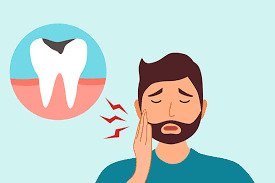
Dental caries, commonly known as tooth decay or cavities, is a prevalent chronic disease affecting individuals of all ages worldwide. While the immediate consequence of dental caries is the formation of cavities, its impact extends beyond mere tooth damage. The sequelae of dental caries encompass a range of complications that can significantly affect oral health and overall well-being.
- Dental Pain and Sensitivity: One of the most immediate sequelae of dental caries is the sensation of pain and sensitivity. As the carious lesion progresses through the enamel and into the dentin, it can expose the nerves within the tooth, leading to discomfort and heightened sensitivity to hot, cold, sweet, or acidic foods and beverages. Dental pain can be debilitating, affecting an individual’s ability to eat, sleep, and concentrate on daily activities.
- Tooth Loss: Untreated dental caries can advance to involve the pulp tissue and ultimately result in tooth loss. The destruction of tooth structure compromises its integrity, leading to weakening and eventual loss of the affected tooth. Tooth loss not only affects the aesthetics of the smile but also impacts chewing function, speech, and overall oral health. It can also contribute to malocclusion and temporomandibular joint disorders.
- Infection and Abscess Formation: Dental caries provides a gateway for bacteria to invade the inner layers of the tooth, leading to pulpitis and eventually pulp necrosis. The accumulation of bacteria within the pulp chamber can result in the formation of a dental abscess—an accumulation of pus at the root of the tooth. Dental abscesses are painful and can lead to systemic complications if left untreated, including cellulitis, osteomyelitis, and even sepsis.
- Gingival and Periodontal Disease: The presence of dental caries can contribute to gingival inflammation and periodontal disease. As bacteria proliferate in the oral cavity, they can colonize the gingival tissues, leading to inflammation, bleeding gums, and periodontal pocket formation. Advanced periodontal disease can result in gum recession, bone loss, and ultimately tooth loss. Moreover, the inflammatory mediators released in response to periodontal infection have been associated with systemic conditions such as cardiovascular disease and diabetes.
- Functional Impairments: Dental caries and its sequelae can significantly impact oral function and quality of life. Tooth loss and untreated caries can impair chewing efficiency, leading to dietary limitations and nutritional deficiencies. Furthermore, individuals may experience speech difficulties and self-esteem issues due to changes in facial appearance resulting from tooth loss and compromised oral health.
- Psychological and Social Implications: The sequelae of dental caries extend beyond the physical manifestations, impacting individuals psychologically and socially. Chronic dental pain and embarrassment associated with dental decay and tooth loss can lead to anxiety, depression, and social withdrawal. Poor oral health has been linked to diminished self-confidence, social stigma, and barriers to employment and interpersonal relationships.
- Financial Burden: Addressing the sequelae of dental caries imposes a significant financial burden on individuals, families, and healthcare systems. The cost of restorative dental treatments, such as fillings, crowns, root canals, and dental implants, can be substantial. Moreover, the expenses associated with managing complications such as dental abscesses and periodontal disease further contribute to the economic impact of untreated dental caries.
In conclusion, dental caries is not merely a localized problem of tooth decay; it has far-reaching sequelae that can profoundly affect oral health, systemic health, and overall quality of life. Prevention remains paramount in addressing this global oral health challenge, emphasizing regular dental visits, good oral hygiene practices, fluoride exposure, and a balanced diet low in sugary foods and beverages. Early intervention and prompt treatment of dental caries are essential in mitigating its sequelae and preserving oral health and well-being.
